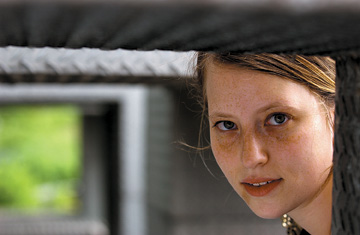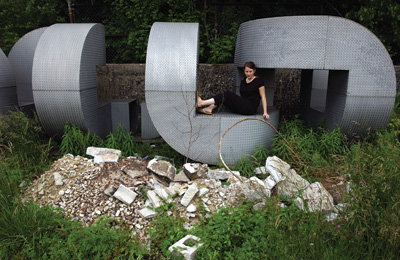 |
|
| Requiem for a Dorm In its fourth annual future alumni essay contest the Magazine invited graduating fourth-years to reflect on the College experience. Slavic languages & literature major Gray Fischer won the $500 prize with an elegy to Woodward Court. In late September of 2000, my befuddled taxi driver gave me an impromptu tour of campus as he circled around trying to find Woodward Court: along the way I saw dozens of kids, overwhelmed with luggage and carrying a hint of my cabbie’s own bewilderment as they moved into Burton-Judson, the Shoreland, and Maclean. At last he pulled into Woodward’s driveway, built around a sunken garbage pit. I was intrigued. But once I entered the Jetsonian lobby, with its two giant staircases—joined at a landing and fanning out, seemingly leading to nothing but the ceiling—I was sold. It wasn’t a charming antique like Snell-Hitchcock, but it was dated—the perfect setting for ironic jabs that grew into genuine affection.
Nestled between the storied beauty of an ivy-clad Ida Noyes Hall and the sprawling yards of Rockefeller Chapel lay the squat vision of a not-too-far-gone future. I remember how often alumni of classes past would stroll through the halls of Woodward, brightly chuckling as they revisited old rooms, retold old stories, and gave warnings to flip the mattresses (just in case). This advice was usually administered to the younger men and accompanied by amiable punches in the arm and knowing smiles. Our class of 2004 was the last to enjoy a full academic year with Woodward, and we can return to the site of our playful escapades only through yellowed gossip and fond, spotty memories. And so, before I leave in search of that Holy Grail, the steady paycheck, I want to pay one last tribute to the dorm that was my College experience. Between Woodward’s U-shaped wings, linked by a section known as the Annex, there was a courtyard that brought out throngs of students. Those not assigned to rooms facing the courtyard could befriend those who had rooms that did and spend several hours staring out their windows, enjoying the benefits of being on the right side of the panopticon. Every day after a long string of classes, I would look up and wave at my brooding friend whose room was directly above the entrance to my wing—the Woodward equivalent of “Honey, I’m home!” Then I would rush upstairs, drop my bags in his room, and join him at the window, waiting for people to trip or catcalling cute students. I’d never been one for school spirit, or team spirit, or any kind of spirit really, but it came naturally to me my first year in the College. Once I figured out exactly where those Epcot-futuro lobby stairs led (to the food), I huddled around my house’s dining table, looking askance at those poor visitors who would have to trek back to their inferior dining-hall-less dorms. Of course, we Woodwardites had the power of a key, and we graciously allowed others into our dorm to enjoy our characteristic goodwill and hospitality. The Escher basement was a popular draw, with its pool room and exercise equipment, but the maze of stairwells and slanted hallways always led us back upstairs for communal television and casual laughter. The lounges were home to couches that redefined the meaning of sloth. It wasn’t procrastination or dubious cable that kept us there: it was the couch, worn soft after years of use, and drooping in the middle. When I first heard that Woodward would be demolished, my greedy eyes zeroed in on that couch. The stars didn’t see fit to grant it to me—but when I’m a stodgy, eccentric billionaire, I’m going to buy a couch and, à la James Stewart in Vertigo, submit it to a series of structural modifications in the hope that it will satisfy me as profoundly as the Woodward one did. At the end of my first year, students had the choice to stay in the doomed Woodward for one final autumn quarter. I remained—and watched my beloved dorm undergo a rapid aging process. Carpet was stripped from the floors before I could say farewell to my favorite and most nostalgic stains. The steel sculpture in the front yard (another item on my eccentric billionaire’s shopping list), which served no purpose I knew other than competitive climbing, was taken down and stored in a warehouse. Sensing her demise, even the faithful couch sagged lower, losing her cushions, with open wounds revealing her wooden spine. This loss was arguably my first adult encounter with death, and once I saw the irreversible decay of the dorm, I grudgingly realized the clichéd wisdom of “letting it go.” Months later, after Woodward had been gutted but before the demolition, a few of us hopped the fence for one last look at our former home. (The best pieces of furniture were gone, and with them my thieving impulses.) Unlike all my other evenings in Woodward, each one a potential candidate for short-story immortality, I hardly remember that night we wandered around, revisiting our bare rooms and kicking rubble on the ground, not saying much at all. We lowered its eyelids and grimly agreed that this wasn’t our Woodward anymore. I’ll agree that my memories of the Wood are not unique—in dorms across America you can find laughing students in the lounge, you can awkwardly walk in on equally awkward heavy petting, and you can pick your way through an obstacle course of legs as you move down the hallway. But dorms like Woodward, with communal bathrooms, “ugly is the new beautiful” rooms, locks that require real keys, and cinder block walls, are a dying breed. While I’m confident that the new class of superdorm, endowed with modern innovations and a penchant for convenience, will foster the same poignant memories that only the first year of college can, I nonetheless feel blessed that I was orientated to the University of Chicago under the staid gaze of Woodward Court. Not to mention those other voyeurs in the Annex. A. Gray Fischer, AB’04, a Slavic languages & literature major from Northridge, California, is returning to her home state to teach at Sierra Canyon School this fall. Fischer, who is also applying to graduate programs, dedicates her four years in the College to Gloria and William Gray of Brentwood, California, and Jordan Weber, JD’65, of Northridge. |
|
phone: 773/702-2163 | fax: 773/702-8836 | uchicago-magazine@uchicago.edu


